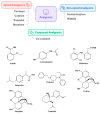Medication Exposure and Risk of Dementia and Alzheimer's Disease
- PMID: 39684561
- PMCID: PMC11641710
- DOI: 10.3390/ijms252312850
Medication Exposure and Risk of Dementia and Alzheimer's Disease
Abstract
Alzheimer's disease (AD), a complex neurodegenerative disease (ND), is the most predominant cause of dementia among the elderly. Generally, elderly people have multiple chronic health conditions, like hypertension, arthritis, diabetes, insomnia, bowel problems, and depression. Although prescribed medications have beneficial therapeutic compositions, some may have side effects that could hinder cognitive function or worsen cognitive decline. Hence, we should evaluate those medications to guarantee their safety. In the present mechanistic review, we discussed frequently used categories of medication (analgesics, anticholinergics, benzodiazepines, proton pump inhibitors, and statins), concerning their possible involvement in increasing AD and dementia risks. This review summarized the results of various observational studies, meta-analyses, randomized case-control studies, and systematic reviews. As the results were contradictory, it was difficult to ascertain the clear associations between medication usage and increased risks of dementia or AD. The blood-based biomarkers (BBMs) offer a low-cost and accessible alternative for early diagnosis of AD. Systematic reviews combined with meta-analysis would be crucial tools for accurately assessing and summarizing the efficacy of health interventions, yet randomized clinical trials have always been the best way to help with clinical care decisions. Thus, an open discussion is necessary to help individuals determine whether the advantages of utilizing medications outweigh the possible drawbacks.
Keywords: alzheimer’s disease; analgesics; anticholinergics; benzodiazepines; dementia risk; proton pump inhibitors; statins.
Conflict of interest statement
The authors declare no conflicts of interest.
Figures










References
-
- Dementia, A.s.a. 2024 Alzheimer’s Disease Facts and Figures Report: Executive Summary Alzheimer’s Association: Chicago, USA, 2024. [(accessed on 10 September 2024)]. Available online: https://www.alz.org/alzheimers-dementia/facts-figures?utm_source=google&....
-
- Anderson P. Alzheimer’s Prevalence Predicted to Double by 2050. [(accessed on 15 September 2024)]. Available online: https://www.medscape.com/viewarticle/alzheimers-prevalence-predicted-dou....
-
- WHO . Dementia. WHO; Geneva, Switzerland: 2023.
-
- United Nations World Social Report 2023: Leaving No One Behind in an Ageing World. 2023. [(accessed on 15 September 2024)]. Available online: https://desapublications.un.org/publications/world-social-report-2023-le....
Publication types
MeSH terms
Substances
LinkOut - more resources
Full Text Sources
Medical
Research Materials

